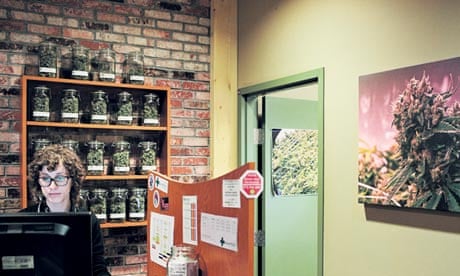I'm being driven around Denver by America's first professional stoner. William Breathes is the marijuana critic for the award-winning local paper Westword. Every week for the past three years, his boss has been paying for his weed.
"I don't really drink wine, so if this reference is a bit off, please forgive me, but if you really like merlots, you know what a merlot should taste like," he says, drumming the steering wheel for emphasis. "A lot of marijuana strains are like that. If I'm offered Sour Diesel, and it doesn't look or smell like it should, I know it."
This morning, like every morning, Breathes woke up and got stoned. Now he's driving me through a snowstorm.
Getting stoned in Denver is as unexceptional as getting a cup of coffee or a beer. In some ways, it's easier: there are more marijuana dispensaries in Denver than liquor stores or branches of Starbucks. In the shadow of the Rocky Mountains, Denver has become America's highest city.
Marijuana has been legal for medical use in Colorado since 2000 and, last November, Colorado and Washington became the first US states to legalise recreational use. Coloradans are allowed to have six cannabis plants at home and an ounce in their pocket. In January next year, the first specially regulated retail stores will open to sell marijuana to anyone aged over 21.
Denver was founded as a mining town during the 19th-century gold rush, and the reversal of state marijuana laws has sparked what people here call a green rush. Everyone wants a slice of the pie, selling plants and resin, marijuana-laced gourmet food, pipes, growing equipment, cultivation courses, balms, you name it. Businesses are opening every week. No longer the drug of choice for the drop-out or the slacker, weed is where the consultants, critics and entrepreneurs are focusing their energies.
Breathes is giving me a tour of South Broadway, known locally as Broadsterdam, because of the profusion of marijuana dispensaries. The area used to be full of empty properties until the industry breathed new life into it. Every two or three doors there's another green neon sign.
"Evergreen Apothecary – that's a pretty clean shop," Breathes says. "They feel really corporate. The Wellspring Collective – they're good, they've dropped their prices down to compete with other shops, like Ganja Gourmet, right here. There's The Kind Room – not that great, a small mom-and-pop shop. The Herbal Center right here, not too great, but the shop right behind it, I can't remember its name, was good. Walking Raven, that's the first place I ever reviewed." He catches his breath and smiles. "You can see how saturated this market is."
The 500 licensed dispensaries in Colorado generated $186m in sales last year, and $5.4m in sales tax. At present, they can sell only to the 110,000 card-carrying medical marijuana users referred by their doctors for symptoms such as chronic weight loss, pain and nausea, but they will be first in line to get retail licences to sell to recreational users once the new law comes into effect in 2014. Within the next five years, the governor's office expects the industry to grow to as much as five times its current size. The state will be able collect tax of up to 15%, with the first $40m already earmarked to build public schools across Colorado.
Amendment 64, which legalises marijuana for recreational use in Colorado, has been a massive headache for the state's government, and governor John Hickenlooper had been vocally against legalisation. It came about through a "citizens' initiative": if enough people sign a petition asking for a constitutional amendment in Colorado, it can be put to the vote. The Amendment 64 ballot took place on the same day as last year's presidential election, and more Coloradans voted for marijuana than for Obama. It passed with 53% of the vote, catching the state off guard.
The rest of the US is watching Colorado carefully. Twenty-five million Americans consume 14,000 tonnes of pot annually, and economist Stephen Easton estimates legal marijuana could be a $45bn-$100bn industry nationwide. Inmates incarcerated on marijuana-related charges cost US prisons $1bn every year. And, according to a paper endorsed by 300 economists, the US government would save an estimated $13.7bn on prohibition-enforcement costs and tax revenue by legalising marijuana.
But marijuana remains federally illegal, and no one is sure what the US attorney general is going to do about Amendment 64. In theory, the federal government could sue Colorado. Hickenlooper has appealed to the White House for guidance, but hasn't yet heard back.
Breathes's desk at Westword HQ is a classic American office cubicle, sober and businesslike, even though the shelves around his computer are filled with cigarette papers and joint holders. A former local reporter with a journalism degree, Breathes, 32, beat 350 candidates to bag his job in 2009. Wearing socks festooned with blue marijuana leaves, he's as evangelical as the next pothead, but with articulacy, ethics and punctuation to impress any of his journalist peers.
"You have to take it seriously," he says. "When I'm testing, I'll do my strains separately, and I'll smoke them on different days to get the feel for them. I've got a recorder, and I talk to myself" – he puts on a voice like a wine aficionado – "'Hmm, very rubbery. A little tart – there's some strawberry in there.' I'll talk about how it popped and sizzled, taking notes between taking hits. And I try not to write my reviews when I'm really, really stoned." Does he meet his deadlines? He smiles, sheepishly. "Not all the time."

He may be Denver's most famous pothead, but William Breathes isn't his real name. As a registered medical marijuana patient – for a chronic stomach condition – he has to show ID every time he goes into a dispensary, and fears he'd get special treatment if the "budtenders" knew they were serving the influential critic. "I know what would happen in an industry like this, where everyone is trying to get a leg up."
In a market this competitive, it takes a lot for a dispensary to stand out. "If the cannabis is good, none of the decor matters. But ambience means a lot to me. I don't know who's reading my reviews. For younger people, it's cool to go into a dispensary with Bob Marley playing and young budtenders, whereas if my grandmother was sick and I was telling her to go to a dispensary, she probably wouldn't like the same one I go to."
Breathes's grandmother would probably like Denver Relief. With its fat leather sofas, potted palms and water cooler, the reception could be a dentist's waiting room were it not for the waft of cannabis that hits you as soon as you walk through the door. (This comes from the plants alone, not from marijuana smoke – lighting up in a dispensary is illegal.) I hand over my driving licence to a receptionist behind bulletproof glass and browse through volumes of an expensive-looking coffee-table book called The Cannabible: glossy photographs of different marijuana strains, richly shot and glistening under studio lights, with names such as Early Queen and Blue Stupor.
The dispensary's owners, Ean Seeb, 37, and Kayvan Khalatbari, 29, are two smokers not apparently devoid of ambition. As well as owning the Denver Relief dispensary and employing 12 full-time staff, they're CEOs of Denver Relief Consulting, advising 70 clients around the country on how to operate within the marijuana industry. They're also founder members of the National Cannabis Industry Association, a political lobby group fighting for the industry in Washington. No one knows for sure what Denver Relief is worth – there's no reliable industry data – but Seeb and Khalatbari say $5m-$10m is a conservative estimate. They pay $100,000 annually in sales tax, "enough to cover at least one city council member's entire budget for the year", Seeb says with a smile.
Seeb and Khalatbari are wearing matching black caps and polo shirts, branded with the sober green cross that is Denver Relief Consulting's logo. They hand me their business cards and take me through a locked door into the dispensary.
"We would consider ourselves businessmen, without a doubt," says Khalatbari, a former engineer who also owns a chain of pizzerias. "Our first interest is to change the perception of the industry. We want it to evolve into something a little better."

The "medicine room" looks like a cross between a wholefood store and a bank. The counter is split into individual stalls, separated by wooden barriers. "It allows us to have one-on-one, discreet communication between the patient and the budtender," Seeb explains. Behind is a wall of exposed brick, with shelves filled with huge jars of marijuana, priced from $10 to $335 a gram – not the cheapest in town, but less expensive than street prices where marijuana is illegal. Can't Buy Me Love plays gently from a large speaker in the corner.
"We have a more professional clientele than other places, because we offer higher quality and more discretion," Khalatbari says. "It's fair to make comparisons with beer – there are craft beers people are willing to spend more money on because they're higher quality."
The shelves in the middle of the room look like a sweet shop. The cannabis-infused products include lollipops, gummy sweets, cookies, brownies, cartons of grape, mango and cherry juice, and chocolate bars in foil packets with exotic flavours such as banana and walnut. They range in size, potency and price. There's a tiny bar, the size of a minute square of chocolate, that's seriously strong and costs $23. For the older customer – sorry, patient – with a less sweet tooth, there are sprays, topical salves and even bath salts.
The corporate meeting room two floors above the dispensary is bare except for a few branded Denver Relief pens on the table and a banner reading "Denver Relief Consulting – Pioneers of the Industry". Seeb and Khalatbari advise many of their product manufacturers, writing marketing reports on their branding, package design and product quality. They also help other dispensaries to get a licence to operate and find reliable staff.
The industry needs consultants, the pair say, because navigating it is a nightmare. Seeb slams a copy of their licence application on the table – it's well over an inch thick. "They took photos of all of my tattoos and scars," Khalatbari says. Licensing costs $12,000 at state level and $5,000 for the city of Denver, renewable every two years. The number of dispensaries in Denver has actually fallen since 2010, when tougher regulation came in.
Most challenging of all, you aren't allowed to get a bank loan, accept credit cards or even have a bank account. American banks are subject to federal law, and they fear losing their insurance if they allow a federally illegal business as a customer. That means the Colorado cannabis industry is purely cash-based: staff are paid in cash, customers pay in cash and businesses pay their taxes in cash in person at the department of revenue.
Colorado repealed alcohol prohibition in 1932, a year before it was repealed nationwide. Seeb and Khalatbari believe the state is now blazing a trail for the rest of the country. Denver's most senior official, on the other hand, doesn't want his city to be America's guinea pig. "We're not proud of it," says mayor Michael Hancock, sternly. "It creates some real challenges for Denver. You've got a lot of businesspeople walking around here with a lot of cash in their pockets or in their facilities, which makes them a target. There are some environmental impacts that we have to be considerate of. It's a very pungent operation – it stinks. And we can't measure what it means to be high. Right now, I can tell you when you're drunk, but I can't tell if you're high. We don't have the standard set within law enforcement to say you are illegally operating a vehicle."
While lawmakers debate how much THC (the psychoactive component in marijuana) a person can have in their blood before they're a danger on the road, Colorado's policemen have to rely on field sobriety tests.
Legalisation also worries officials in neighbouring states. Colorado is expecting a tourism boom as soon as the recreational shops open, and while the amount non-residents can buy in each transaction will be limited, there's nothing to stop tourists going to 100 dispensaries and buying 100 small amounts. No one patrols the state borders. Many in the Mormon state of Utah next door are horrified.
It's certainly true that marijuana stinks. The Denver Relief growing facility is in a vast, grey unmarked warehouse, but I can smell it from across the street. The snow is blowing horizontally on the industrial estate, but once I'm inside the door, there's tropical heat, bright blueish lights, and Smells Like Teen Spirit is playing on the radio.
"Come on in," head grower Nick Hice says. He takes me into the vegetation room, one of three 1,000 sq ft spaces filled with cannabis. There are 1,000 plants in this room alone, and every one is tagged and labelled. "All the 'moms' are here," he says. "We take cuttings off these big gals; they get potted up and repotted as they grow." There are 35 strains in the warehouse, some fat and spiky, others thin and spindly. They look beautiful and exotic, but the immaculately clean room, with its white walls and giant whirring fans, has the atmosphere of a hospital or a laboratory.
Cannabis is notoriously difficult to cultivate, and an operation this intensive requires serious investment. In every room, 10,300 watts-worth of lights shine 24 hours a day, generating a $5,000-a-month electricity bill. The warehouse gets through 14,000 litres of water a week. A grow technician is surveying every leaf with a magnifying glass, looking for mites. "There are bugs that love cannabis," Hice says. "If we had a catastrophic crop loss in this one room, it would cost us anywhere from $200,000 to $300,000." Even so, the Denver Relief grow site is only moderately sized by Colorado standards. Across the state, 45 tonnes of marijuana was cultivated last year.

Knowing how to grow cannabis is a lucrative business, as the brains behind THC University are finding out. Matt Jones, 25, and Freeman LaFleur, 26, run what they call "the nation's premier cannabis training destination", teaching keen amateurs and budding businessmen how to make the most of the six plants they're allowed to grow at home. They've been entrepreneurs since they were teenagers. The night Amendment 64 passed, they started talking about how they could get into the marijuana industry.
We meet at the Karmaceuticals dispensary, where Jones, LaFleur and head instructor Ted Smith are having promotional shots taken for their website. Around 50 people have so far signed up to take one of their 14 classes, which range from the best-selling Growing Marijuana 101 to Hash and Oils, Pests and Disease, Cooking and Infusion, and Marijuana Law and Business. "We're teaching total plant husbandry," Smith says.
This expertise doesn't come cheap. The classes cost $100 each online, or $200 in their rented university classroom on Auraria campus. Students get accreditation for attending a certain number of classes: "budtenders" have been to five, "certified indoor growers" 10, and "masters" to all 14. Doing the full course costs close to $1,500. But Jones and LaFleur say it's worth it – they're going to create an industry-standard qualification, and are applying to be a state-certified occupational school.
It's not the first marijuana business idea Jones has come up with. In 2010 he set up CannaCoups, a kind of Groupon for medical marijuana discounts. "It was really before its time. Now Toke Daily Deals are doing it. It's really popular," he shakes his head.
THC University, too, appears to be ahead of the curve. "The green rush isn't at full steam yet, but it's building," LaFleur says. "In five years it's going to be a very different landscape." Jones is more emphatic: "In five years, we'll see federal decriminalisation, at least."
The rise of the marijuana industry in Denver certainly appears unstoppable. Too many people want a piece of the action, and there are too many customers willing to part with their money for it.
Breathes has been smoking cannabis for more than half his life, but he has no nostalgia for the old days, no regrets about the industry becoming commercialised. "People are fighting for customers," he says. "From a consumer standpoint, it's great. I have no problems with the commercialisation of it, because that equates with normalisation in America. In Colorado, it's really very normal."






Comments (…)
Sign in or create your Guardian account to join the discussion